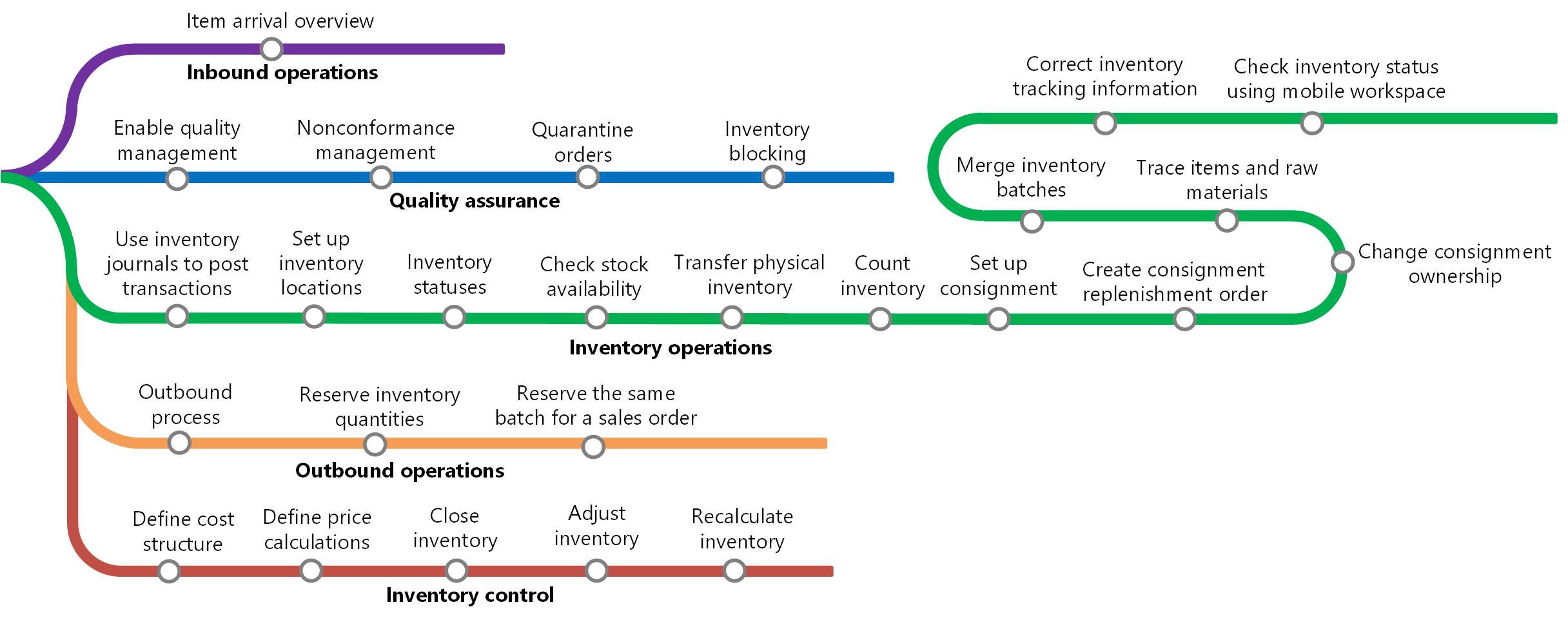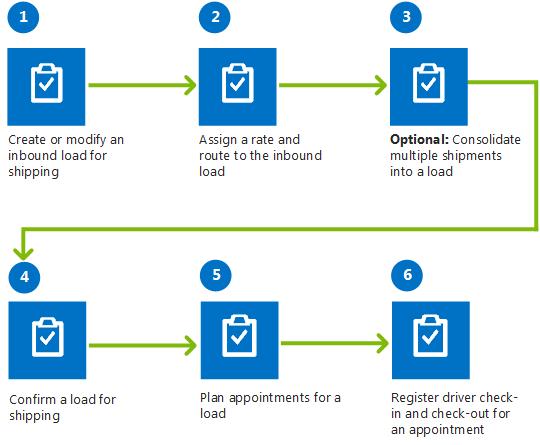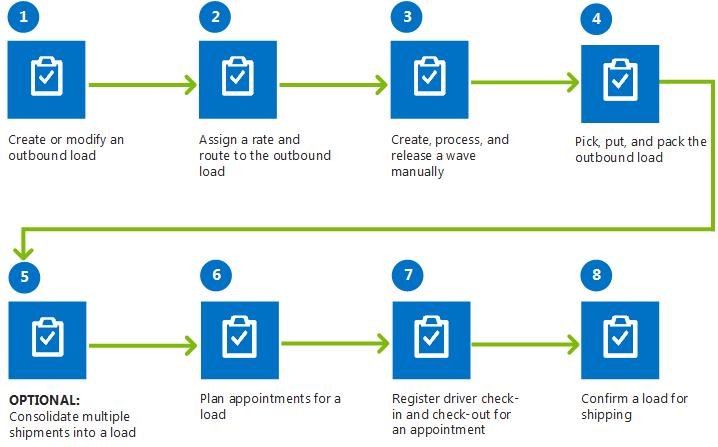Managing Logistics with Dynamics 365 Supply Chain Management
Dynamics 365 Supply Chain Management solution is a magic wand in the world of transportation and logistics. Created specifically to help businesses enhance their supply chain resilience through real-time visibility and AI-driven insights, it enables effective management of costs, inventory control, and transport administration. Its key functionalities include:
Inventory Management
Microsoft Dynamics 365 Inventory management provides a system for managing inventory across various processes. It helps streamline inbound and outbound workflows, quality assurance, and inventory activities. The system offers such features as real-time inventory tracking, optimal stock-level recommendations, and comprehensive reporting tools to improve operational efficiency and visibility in warehouses. Here is a framework for the Inventory management module.

Landed Cost
The Landed cost module is a critical component of the supply chain for businesses involved in international trade. By providing comprehensive financial and logistical control over imported freight, from the manufacturer to the warehouse, this module helps companies optimize their inbound shipping operations. Key features of Landed cost are:
- Accurate Cost Estimation: Project landed costs during voyage creation for precise financial planning.
- Flexible Allocation: Spread landed costs to multiple items, purchase orders, or transfer orders within a single voyage.
- Inter-Location Transfers: Support the seamless transfer of goods between physical locations by identifying landed costs.
- Accrual Accounting: Recognize accruals for goods in transit to maintain accurate financial records.
- Comprehensive Visibility: Gain increased financial and logistical visibility into the extended supply chain, enabling better decision-making and risk management.
Warehouse Management Processes (WMP)
Dynamics 365 WMP, or Dynamics 365 for Warehouse Management, is a part of the Dynamics 365 suite that focuses on optimizing processes related to warehouse operations. WMP empowers companies to maximize warehouse efficiency by tailoring their layout to dynamic needs. Businesses can utilize Warehouse management processes to complete the following tasks:
- Designation of high- and low-priority zones for strategic product placement.
- Creation of dedicated areas for specific storage needs, like temperature control or item turnover rates.
- Identification of storage locations down to the bin level for granular control.
- Grouping locations by capacity constraints to maximize utilization.
- Implementation of rule-based processes to automate item handling based on defined criteria.
When configuring the warehouse, it’s essential to enable warehouse processes based on the company’s business needs. Key components to set up include wave templates, work templates, work pools, and location directives.
Transportation Management
The Dynamics 365 Transportation management module allows businesses to manage their transportation operations effectively. It includes features for planning and executing transport strategies, optimizing routing and vendor selection, and managing both inbound and outbound logistics. This comprehensive solution helps transportation professionals enhance efficiency and reduce costs. Here is how enterprises can manage their inbound and outbound transportation with the capabilities of Dynamics 365:
Inbound
Enterprises can proficiently manage their inbound transportation using Supply Chain Management tools. Here is the business process flow for planning transportation for an inbound load.

Outbound
By utilizing Supply Chain Management tools, businesses can effectively plan transportation and shipping for these outbound loads. Here is the process flow for planning and processing outbound loads for shipping.

If you are interested in other Microsoft solutions, read our articles about Microsoft 365 and Microsoft Azure to learn more about this topic.
Now let’s discover another powerful driving force for the logistics and transportation industry from Microsoft D365.

Boosting Transport & Logistics Processes with Dynamics 365 Business Central
Business Central is an all-in-one business solution with features and modules specifically designed to cater to the logistics industry, including a Transportation Management System (TMS) and tools for managing pallets, boxes, and containers. This makes it suitable for improving logistics and transportation operations.
Let’s dig deeper into the reasons why Business Central is the “it” solution for logistics companies.
Enhanced Customer Experience
By utilizing Business Central and modules like Dynamics 365 Sales, Customer Service, and Field Service, enterprises can boost their customer experience, perform a seamless transition from sales to service, track clients’ returns and repairs, and manage service agreements to meet and exceed customer expectations consistently.
Improved Automation
Creating or updating customer orders can be time-consuming. With Copilot in Business Central, managers can quickly add items by describing them, pasting details, or referencing past orders. Copilot suggests line items from the catalog, streamlining the process and allowing sales teams to focus on other important tasks. Leverage advanced AI with Copilot and automated workflows to simplify processes, accelerate tasks, and enhance decision-making.
Global Compliance
International companies must support multiple currencies, exchange rates, languages, consolidations, tax regulations, and intercompany transactions. With Local functionality in Business Central, enterprises can tailor features to comply with specific laws, regulations, and operational practices of individual countries or regions.
Streamlined Inventory Warehouse Management
Optimize inventory replenishment with AI-powered forecasts, factoring in real-time data, demand trends, and product availability. Enhance warehouse organization and streamline inventory management with a barcode-assisted pick-and-put-away process.
Wrap-Up
In conclusion, Dynamics 365 is a powerful tool for transport and logistics businesses. It streamlines operations, boosts productivity, and enhances customer satisfaction. With features like inventory management, landed cost calculation, warehouse management, and transportation management, Dynamics 365 helps businesses optimize their supply chain and gain a competitive edge.
To get the most from Microsoft Dynamics 365 capabilities, you need a team of experts for the system’s acquisition, implementation, and tailoring. HYS Enterprise, as an official partner of Microsoft, is a reliable partner who is ready to help you unleash the power of Dynamics 365 for your company. Ready to take the first step to optimize your business? Book a call with us!
